D.C. Circuit Review – Reviewed: A Bad Week for the DDC and the D.C. Circuit
Note: This will be a quick post.*
I like to come up with creative themes for D.C. Circuit Review — Reviewed. For the last two weeks, however, I’ve failed miserably: A Bad Week for the DDC and A Bad Week for the D.C. Circuit. Unfortunately, this week’s theme is even worse. For you see, I’ll explain why this was a bad week for the DDC and the D.C. Circuit.
The most obvious example is Trump v. Mazars USA, LLP. The Supreme Court “vacated and remanded” the panel decision that affirmed the DDC. But that’s not the only blow. Little Sisters of the Poor Saints Peter and Paul Home v. Pennsylvania repudiated the D.C. Circuit’s “open mind” standard to post-promulgation notice-and-comment. All the while, the DDC again took a beating.
Judge Garland (joined by Judges Tatel and Silberman) authored In the Matter of the Application of Jason Leopold to Unseal Certain Electronic Surveillance Applications and Orders. (That’s a very specific case name.) Jason Leopold asked the district court to unseal certain records. The district court determined that the documents were judicial records but denied some of the requests due to the administrative burden. On appeal, the panel didn’t buy it: “Administrative burden, when taken into consideration as necessary to protect other relevant interests, may affect how and when judicial records may be released. But it is not dispositive of whether judicial records may be released at all.” (An aside: I’m not a fan of pop culture references in judicial opinions. But I did enjoy the surprise on page 22.)
Likewise, in Charles Strange v. Islamic Republic of Iran (consolidated with In re: Charles Strange), Judge Henderson (joined by Judges Griffith and Wilkins) addressed whether a district court can restart the clock for filing an interlocutory appeal. “Here, the district court certified an order for interlocutory appeal but no petition was filed by section 1292(b)’s deadline. The district court thereafter granted a motion to recertify its order and the litigants filed both a petition for permission to appeal and a notice of appeal within ten days after recertification. We conclude in this consolidated opinion that a district court cannot restart the jurisdictional clock in this manner.” Because there was no appellate jurisdiction, we don’t know how service-by-Twitter works.
Cigar Association of America v. FDA is another reversal. Judge Katsas (joined by Judges Garland and Randolph) addressed the Tobacco Control Act. In 2016, the FDA subjected products like cigars and pipe tobacco to health warning requirements. Yet FDA did not consider how health warnings would likely affect the number of smokers. The Court concluded that was not permissible. Here is a line that will be cited again: “We cannot uphold a final rule based on reasoning that appears only in the notice.” To be sure, the Court did uphold the DDC in one case. In Vipula Valambhia v. United Republic of Tanzania, Judge Pillard (joined by Judges Garland and Katsas) affirmed the district court’s dismissal of a complaint for “lack of subject matter jurisdiction under the commercial activity exception to the Foreign Sovereign Immunities Act (FSIA).” I’ll leave it at that.
The Court decided more cases, but they didn’t involve the DDC.
In Clean Wisconsin v. EPA, for instance, Judges Tatel, Griffith, and Pillard issued a per curiam opinion regarding air quality. Environmental lawyers should give it a read. For me, the most interesting part of the opinion was the panel’s discussion of EPA’s request for “a voluntary remand of some designations.” Here is the key paragraph:
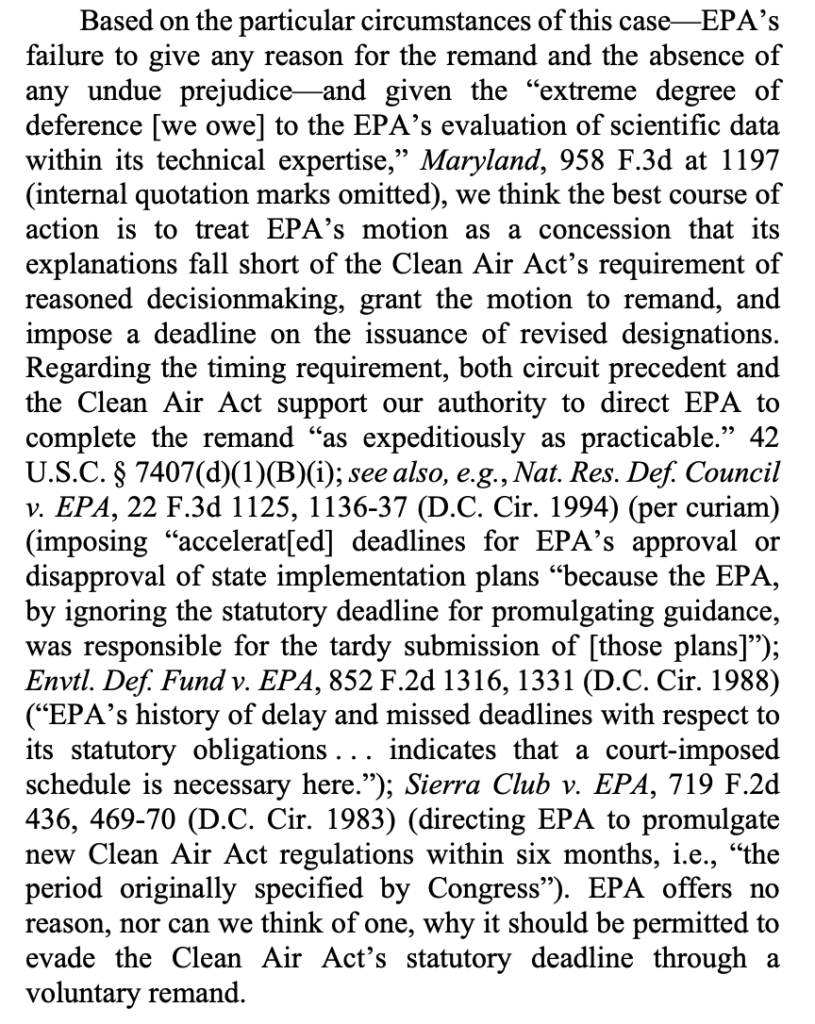
In National Association of Regulatory Utility Commissioners v. FERC, Judge Wilkins (joined by Judges Rogers and Garland) opened his opinion this way:
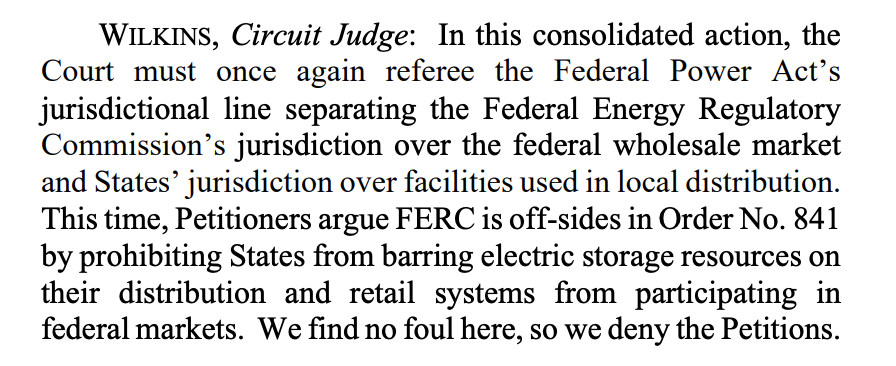
And here, I think, is the most interesting snippet:
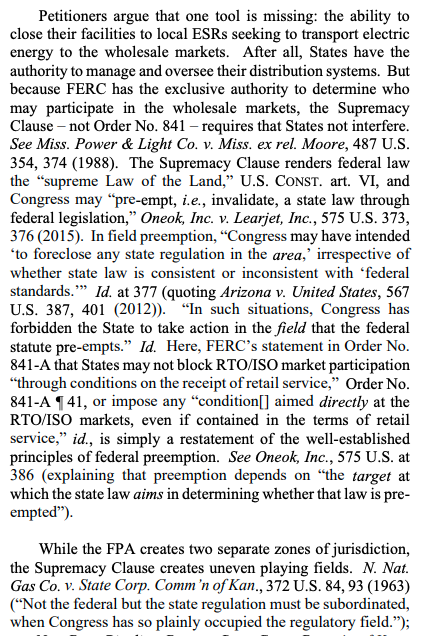
Jordan Louie v. Stephen Dickson is a case against the FAA “related to a proposed airport expansion” in Atlanta. Judge Srinivasan (joined by Judges Griffith and Katsas) dismissed for lack of jurisdiction. Here’s a sample:
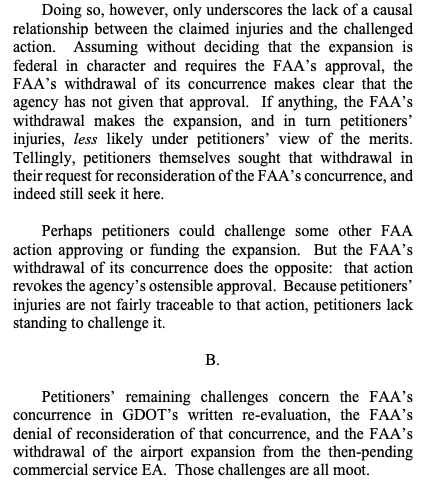
Finally, we have Pinson v. Department of Justice (and Gorbey v. United States). Judge Tatel (joined by Judges Rao and Sentelle) addressed the Prison Litigation Reform Act’s three-strikes rule — and in particular the exception for suits where the plaintiff is “under imminent danger of serious physical injury.” The key takeaway? There is a nexus requirement:
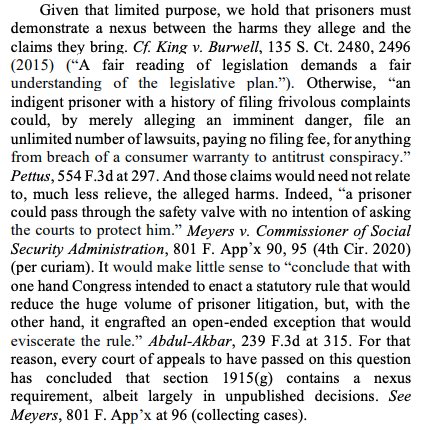
And that’s the week. Next time I may come up with something more creative. Or maybe not.
* I spent the day in the world of government contracts.
D.C. Circuit Review – Reviewed is designed to help you keep track of the nation’s “second most important court” in just five minutes a week.



